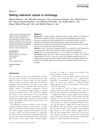 4 citations,
September 2019 in “Journal of Cosmetic Dermatology”
4 citations,
September 2019 in “Journal of Cosmetic Dermatology” FUE megasession effectively treats severe hair loss with natural-looking results in one operation.

New treatments for hair loss should target eight main causes and use specific plant compounds and peptides for better results.
 12 citations,
May 1995 in “Australasian Journal of Dermatology”
12 citations,
May 1995 in “Australasian Journal of Dermatology” Hair loss in women can be slowed with treatment, but more research needed for better solutions.
 11 citations,
December 1921 in “Archives of dermatology and syphilology”
11 citations,
December 1921 in “Archives of dermatology and syphilology” A rare scalp disease causes hair loss, pus-filled nodules, and scarring.
 18 citations,
April 2013 in “Inflammatory Bowel Diseases”
18 citations,
April 2013 in “Inflammatory Bowel Diseases” People with Inflammatory Bowel Disease often lose hair due to stress, medication side effects, or lack of nutrients, and treatment depends on the specific cause.
 November 2012 in “South African Family Practice”
November 2012 in “South African Family Practice” The article concludes that early treatment of alopecia is crucial to prevent permanent hair loss.
 8 citations,
September 2010 in “Journal of Men's Health”
8 citations,
September 2010 in “Journal of Men's Health” Androgenic Alopecia, a common hair loss condition, can be effectively treated with finasteride and other treatments.
 23 citations,
January 2013 in “Indian Journal of Dermatology, Venereology and Leprology”
23 citations,
January 2013 in “Indian Journal of Dermatology, Venereology and Leprology” FPHL causes hair loss in women due to genetics and hormones; minoxidil and anti-androgens are treatments, and early intervention is advised.

Ovol2 is crucial for hair growth and skin healing by controlling cell movement and growth.
 29 citations,
June 2013 in “Journal of the Saudi Society of Dermatology & Dermatologic Surgery”
29 citations,
June 2013 in “Journal of the Saudi Society of Dermatology & Dermatologic Surgery” Alopecia areata is an autoimmune hair loss condition treated with corticosteroids, and histologic confirmation is the best diagnosis method.
 95 citations,
November 2016 in “Journal of The American Academy of Dermatology”
95 citations,
November 2016 in “Journal of The American Academy of Dermatology” Treatments for permanent hair loss from scarring aim to stop further loss, not regrow hair, and vary by condition, with partial success common.
 November 2023 in “International journal of biology, pharmacy and allied sciences”
November 2023 in “International journal of biology, pharmacy and allied sciences” Herbal treatments can help with hair problems, but more research is needed.

Nanocarriers with plant extracts show promise for safe and effective hair growth treatment.
 January 2020 in “Der Pharmacia Lettre”
January 2020 in “Der Pharmacia Lettre” Nanoparticle-based herbal remedies could be promising for treating hair loss with fewer side effects and lower cost, but more research is needed.
 3 citations,
October 2015 in “International Journal of Dermatology”
3 citations,
October 2015 in “International Journal of Dermatology” Normal hair density and diameter ratios were established to help diagnose adult hair loss.
 14 citations,
April 2019 in “Saudi pharmaceutical journal”
14 citations,
April 2019 in “Saudi pharmaceutical journal” Microparticles help caffeic acid stay longer in hair follicles for better treatment of folliculitis.
 April 2024 in “Current research in nutrition and food science”
April 2024 in “Current research in nutrition and food science” Taking an amino acid supplement improved skin, hair, and nail health in women.
 2 citations,
December 2015 in “International Journal of Dermatology”
2 citations,
December 2015 in “International Journal of Dermatology” Washing test helps identify hair loss type, low iron levels significant.
May 2023 in “Clinical, Cosmetic and Investigational Dermatology” More personalized and effective treatments for androgenetic alopecia are needed.
 24 citations,
January 2013 in “Indian Dermatology Online Journal”
24 citations,
January 2013 in “Indian Dermatology Online Journal” Balding people may have higher heart disease risk.
 1 citations,
June 2012 in “Actas Dermo-Sifiliográficas”
1 citations,
June 2012 in “Actas Dermo-Sifiliográficas” Early and aggressive treatment of scarring alopecia is important to prevent further hair follicle damage.
 57 citations,
September 2005 in “International Journal of Dermatology”
57 citations,
September 2005 in “International Journal of Dermatology” Frequent use of chemical hair relaxants is linked to increased scarring hair loss in Nigerian women.

Oral minoxidil is as effective and safe as topical minoxidil for treating female pattern hair loss.
 10 citations,
June 2019 in “International Journal of Cosmetic Science”
10 citations,
June 2019 in “International Journal of Cosmetic Science” Some plant-based chemicals may help with hair growth, but more research is needed to confirm their effectiveness.
 2 citations,
September 2021 in “Orphanet Journal of Rare Diseases”
2 citations,
September 2021 in “Orphanet Journal of Rare Diseases” People with hypohidrotic ectodermal dysplasia are more likely to experience long-term fatigue and hair loss after COVID-19.
April 2024 in “Journal of clinical medicine” Effective treatment guidelines for frontal fibrosing alopecia are still unclear.
 67 citations,
February 2015 in “Life Sciences”
67 citations,
February 2015 in “Life Sciences” Some plant-based treatments can help with benign prostatic hyperplasia symptoms, but more research is needed to confirm their safety and effectiveness.
 January 2020 in “Asian journal of applied science and technology”
January 2020 in “Asian journal of applied science and technology” Good nutrition is crucial for health and preventing disease, and supplements can help prevent nutrient deficiencies.
 8 citations,
May 2020 in “Anais Brasileiros de Dermatologia”
8 citations,
May 2020 in “Anais Brasileiros de Dermatologia” Higher levels of ischemia-modified albumin in telogen effluvium patients may indicate oxidative stress.
23 citations,
October 2020 in “Anais brasileiros de dermatologia/Anais Brasileiros de Dermatologia” Tailored treatments for alopecia areata are recommended based on severity and patient needs.



























